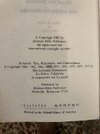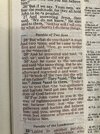chuckd
Puritan Board Junior
We were discussing the parable of the two sons in Matt. 21:28-32 last week.
All translations have v29 as the son who said he wouldn't go work, but repented. And v30 as the son who said he would go, but didn't.
One person in our group, who has an NASB translation had the opposite. The lip service son was in v29 and the one who eventually worked in v30.
When I look up NASB online, it agrees with the other translations. So I snapped a picture of her physical Bible. Is this errata or some weird manuscript issue?
All translations have v29 as the son who said he wouldn't go work, but repented. And v30 as the son who said he would go, but didn't.
One person in our group, who has an NASB translation had the opposite. The lip service son was in v29 and the one who eventually worked in v30.
When I look up NASB online, it agrees with the other translations. So I snapped a picture of her physical Bible. Is this errata or some weird manuscript issue?



